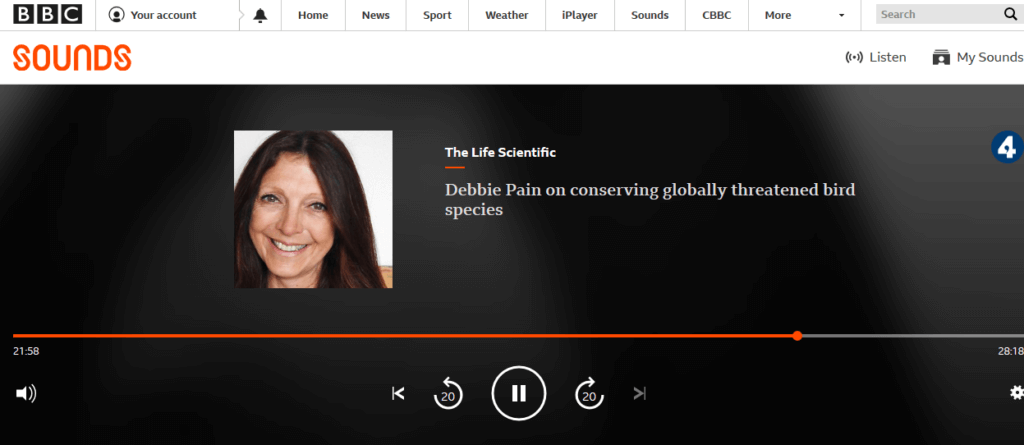
This programme is quite fun – my friend Debbie Pain talks about lead poisoning, saving Asian vultures and the Spoon-billed Sandpiper. Although I’m sure there is even more to come, the examples demonstrate how Debbie has already had a career packed with both scientific and conservation achievement.
It’s well worth a listen. And it provides an insight into how conservation is done, how it can succeed when based on good science, and what makes scientists tick.
What you wouldn’t pick up from this interview is how much vitriol has come Debbie’s way from the shooting industry, and how little notice government is still taking of lead issues. Just because the science is there it doesn’t mean that anyone is going to take notice of it. In fact, as with other issues such as smoking and cancer in the past, there is often a campaign to cloud the issues, disguise the truth and prevent progress.
The BBC is planning a series called The Life Unscientific for members of government, statutory agencies and the shooting organisations…
For another take on Debbie’s life and work, read the interview with her in Behind the Binoculars.
[registration_form]
Love your irony Mark! The Life Scientific has been one of my favourite R4 progammes for a long time. This exposure of lead poisoning on such a prestigious broadcast can only be positive.
I went straight to Behind the Binoculars to re-read your interview with Debbie Pain following her mention of you.
I was quite surprised when the presenter said he didn’t know about the Asian vulture catastrophe until he was researching for the programme.
I must say, I don’t think establishing a captive population of Spoon-billed Sandpipers at Slimbridge was a good idea. Much better the head-starting and research on the breeding grounds and the staging and wintering areas.
It is difficult for many of us who have known about the Asian vulture catastrophe for several years to understand that it is not more widely known. When people of the intellect and scientific background of Jim Al-Khalili haven’t heard of it there is something wrong with the methods of disseminating the information either by the funders, the researchers or the press.
I have been to several seminars and meetings where the Spoon-billed sandpiper project has been discussed and was convinced that the captive breeding strategy was the best approach. Debbie Pain talked fairly graphically of the difficulties of getting to the breeding grounds. Getting the eggs to Slimbridge was obviously a huge task but the facilities and oversight of the project seemed to justify the effort.
Thanks Richard. On the vultures, I guess we are interested and care. Perhaps if Gretta had been around when it all kicked off…
On the Spoonies, I may be behind the times but I didn’t think captive breeding has contributed much other than raising the profile of the project – it was all very dramatic. The head-starting on the breeding grounds and protection on the staging and wintering grounds seems to be having a very positive effect.
Mark
It is good to see that readers of your blog know about the South Asian vulture crisis that Debbie has been instrumental in trying to fix, even if Jim Al-Khalili didn’t know much about it. However, I note with concern the point made about researchers and conservationists not having done enough to make others aware of the problem. They can help with that by looking at and then sharing this website https://save-vultures.org/ about the work of SAVE (Saving Asia’s Vultures from Extinction), an international consortium co-operating to try to turn vulture population declines around. Maybe you could give SAVE a bit of further publicity in your blog as well?
Head-starting is undoubtedly making the most difference in terms of the more ‘hands-on’ components of the project at the moment. However, that wasn’t an inevitable outcome given what was known when conservation breeding was first attempted. We didn’t know if conservation breeding would succeed, but all of the evidence at the time showed that it was an essential conservation action to attempt to provide an ark for a species that was rapidly moving towards extinction. Head-starting is unlikely to have happened without the initial trips to get eggs for conservation breeding. It was the high success rate of collecting and hatching eggs and rearing young for the conservation breeding project that gave WWT’s inspirational head of conservation breeding, Nigel Jarrett, the idea of trying head-starting. We didn’t know if head-starting would work either (for many reasons) but it has been remarkably successful. The key thing is to follow the best evidence that you have, and adapt actions as more information becomes available. I understand why informed listeners such as Bob W would question why the breeding component and not head-starting was mentioned in the interview. I did discuss head-starting in my recorded interview, but it was a long interview and it’s not possible for the editors to keep everything in such a short time period and I think they did a good job. If you subscribe to British Birds you can follow the science behind the decision making and how things changed over time as more information became available in BB 2011 Vol 104:350-363; BB 2014 Vol 107:467-475 and BB 2018 Vol 11:323-333. Thanks very much for your interest.
Thanks for the additional information, Debbie – appreciated. A shame head-starting was edited out of the interview. I guess it was never going to compete with the drama of getting the eggs back to Slimbridge, even on Radio 4.
Mark, should we assume that when applying to work for you at RSPB Debbie didn’t mention her enthusiasm for Linnets?